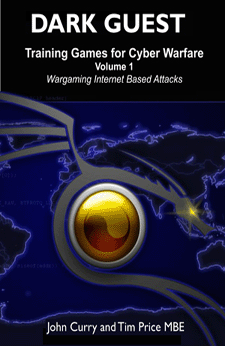The History of Wargaming Project
The project aims to make the largest possible collection of wargaming books and rules available to the modern reader. Ranging from second editions of wargaming classics, to professional wargaming rules used by the military and innovations in current wargaming.

|
|

|
Dark Guest Training Games for Cyber Warfare Volume 1 Wargaming Internet Based Attacks
23 December 2013
by John Curry and Tim Price MBE |
|---|
| |
| Out of print, please see the cyber wargame handbook for an unpdated edition |
|
Product details: Paperback: 97 pages Publisher: History of Wargaming Project ISBN: 978-1291669121 Dimensions: 15.6 x 23.4 cm |
|
|
Review: Curry and Price, Dark Guest (Training Games for Cyber Warfare) by Rex BrynanReproduced with permission from the Pax Sims Blog where it was published on the 21/4/14 This booklet is intended as a guide and aid for those involved in promoting broader awareness of “cyber warfare” and information security within their organizations. It consists of a discussion of the challenges of training on the issue, and overview of cyberwargaming, and a brief discussion of the rise of hacking and hactivism. Thereafter, it presents five games that can be used (or modified) in a training context:
The games are not technical ones. Indeed, experts in cybercrime, warfare, and hacktivism may find the lack of technical detail and analysis in this volume surprising. If so, they would be missing the point. Dark Guest is intended to provide resources for those who have the task of spreading awareness of cyberwarfare issues within larger organizations, possibly inspiring them to modify the sample games provided or develop their own for their own particular needs. The games are thus designed to encourage non-IT specialists and managers to think about potential vulnerabilities (although some might also encourage IT specialists to go beyond issues of hardware and software to reflect on more general questions of policy, strategy, and context). All of the games are relatively free-form, and most are rather abstract. They are thus highly adaptable and designed to promote discussion-through-play. Most can also be played quite quickly, making them very suitable as ice-breakers or to provide a change-of-pace as part of a broader training programme. A previous edition of Dark Guest included a full rules-based card game on cyberwarfare, which has been dropped in this edition precisely because the authors feel that a book containing “generic ideas… [with] wider application” would be more useful for those seeking to integrate serious games into their training process. One key aspect that the authors note, but could do more to address, is the fundamental importance of effective game facilitation and umpiring in free-form games such as these. Considerable skill is required to do this, since the moderator simultaneously needs to run the game, adjudicate actions (in a way that participants find convincing), maintain player engagement, deal with less cooperative players or those “fighting the scenario,” while all the time exploiting the teachable moments that the game generates. Experienced teachers may have some of these skills, and experienced role-playing-game “dungeon masters” have others—but not all neophytes have all of them. Given that this is volume 1 in what promise to be a continuing series—and given its association with the longstanding History of Wargaming research and publication project—this may well be an aspect that the authors turn to in a subsequent volume. |